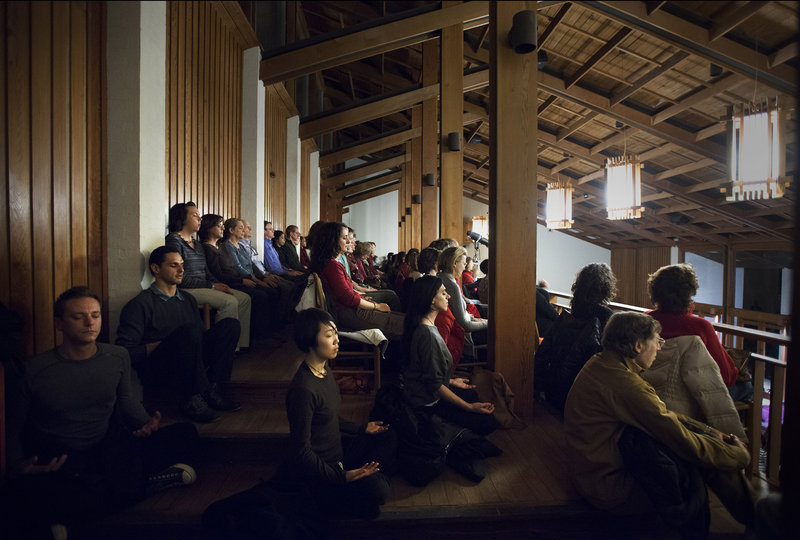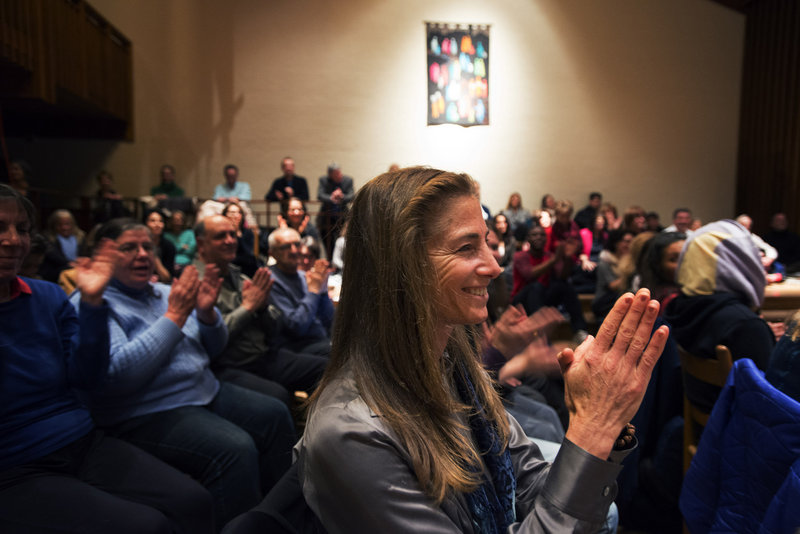WASHINGTON – A tornado warning was in effect in Washington and the rain was coming down in sheets, but the little residential roads around the River Road Unitarian Church in Bethesda, Md., were gridlocked with traffic, as they are every Wednesday night. Washington’s strivers were striving to chill out.
Hundreds of people were rushing to the weekly class of Buddhist meditation teacher Tara Brach, a therapist who has become a must-listen for many urban professionals. Inside, her calm voice fills the silence.
“What does it matter for us to be in touch with our deepest aspiration?” she says into a headset. “Was today a trance? How much was I here today?”
Listening that night would be far more than the 300 people in the room. Brach’s talks are downloaded free nearly 200,000 times each month by people in more than 150 countries. Strangers write from around the world to say her words have saved them from committing suicide or relapsing into drugs. Government contractors who parachute into Washington plan trips around her class. One devotee last year gave her newborn son the middle name Brach.
Brach is riding a massive American wave of meditation, a mind-training practice meant to heighten self-awareness and compassion. Its popularity is particularly high among Americans who don’t identify with a particular religious affiliation, a group that’s grown from 7 percent to nearly 20 percent of the population since the early 1970s. In a nation of people busily crafting their own religion, meditation may be the new American prayer.
The meditation school that Brach founded, Insight Meditation Community of Washington, is one of the biggest in the country. Brach and her husband, Jonathan Foust, a yoga and meditation teacher who is former president of the well-known retreat Kripalu in Massachusetts, are the royalty of Washington’s spiritual-but-not-religious crowd.
Brach’s appeal in Washington makes sense: She’s a Type A go-getter. The petite 60-year-old focuses on pragmatic struggles such as body image, divorce and being controlled by your To Do list. She drives a BMW and lives in posh Great Falls, Va. She talks about aspiration.
Brach is a Buddhist meditation teacher and member of the Buddhist clergy, yet finds traditional Buddhist texts sexist and cold. She strips religious language out of her classes so as to not turn off secular types, but worries about people not going deep.
Some Buddhist figures call her secularized approach radical.
“She’s clearly treating modern forms of sickness,” said Clark Strand, a well-known Buddhist writer. “But it’s part of a culture-wide experimentation being done with yoga, meditation and other spiritual technologies to see how well they work in the absence of the ethical systems and belief systems that have supported them for thousands of years. And the answer isn’t clear yet.”
To Brach’s many devotees, she is foremost a healer. Her new book, “True Refuge,” about her recent search for calm in the face of serious illness, debuted on The Washington Post’s bestseller list the week in February it was released.
Her followers include devout Catholics and Muslims, trauma-struck veterans and 12-steppers with a range of addictions. The vast majority are not Buddhists, but spiritual seekers drawn to Brach’s calming voice as she shares Buddhist teachings, folksy stories and quotes from the likes of Oprah, D.H. Lawrence and Supreme Court Justice William O. Douglas.
Gray Clark was desperate when he began listening to Brach. His young daughter had a mood disorder, and the family was struggling to manage her outbursts and their own anxiety. A churchgoing evangelical since birth, Clark, 43, needed practical tools and a philosophy to help him accept his situation but not be consumed by it.
The Charlotte computer engineer turned to meditation, first locally and then through Brach, whom he now listens to on his daily long runs. He travels a lot for work, and if he’s within an hour of Bethesda on a Wednesday, he goes to River Road.
As is the case with many of her devotees, Brach is in many ways both therapist and spiritual guide to Clark. Her teaching awakened “much more compassion and understanding and openness . . . which to me, that’s what God is about,” he said.
“So much of religion is about following some creed or dogma, and by and large, people aren’t looking for that,” he said after Brach’s recent class. “They’re looking for something much deeper.”
Brach has always been drawn to spiritual depths. After growing up Unitarian in New Jersey, she took up an intense type of yoga and meditation called kundalini. She joined an ashram, took a vow of celibacy and entered into an arranged marriage. For a decade, her life was waking before dawn, playing guitar, chanting. She was blown away by the feeling of transcendence and compassion that yoga and meditation could bring.
In her 30s, she began to see that lifestyle as rigid, a “false refuge” or Type A spirituality — more about trying to be perfect than about balance.
She left the ashram, turned to Buddhism and divorced. Buddhism, she says, is about “waking up, but not striving.” She was ordained into the Buddhist clergy in the mid-1990s but has moved to less-specific language, saying she is influenced by a range of spiritual teachings. She talks about “the deeper dimension to self” and love as a “formless presence.” Struggle, she told her students earlier this year, is part of our longing not for happiness but for meaning, to be “part of something larger. Which is waking up to who we are.”
She describes her own awakening in her new book, which lays out how three decades of meditation, several religious transformations, divorce and motherhood didn’t prepare her for the shock of mortality.
A decade ago, she was found to have a condition associated with Fragile X, a genetic disease that can effect the elasticity of the connective tissue. It left the avid athlete in pain and unable to walk very well. She has since significantly improved and regained a lot of her health, but the experience remained.
Brach’s message has particular appeal to baby boomers juggling care for children, parents and themselves.
“We’re both at a pragmatic point, especially living in the D.C. area with all this unprecedented stress right now. Especially among boomers, with the responsibility of raising family, their parents’ health, their own mortality,” said Foust, Brach’s husband. He jokes about it, darkly: “We are in the suffering business, and business is booming.”
But when it comes to Buddhism, Brach knows she is on the secular fringe. She’s gone from someone who swore off sex and wore white from head to toe to a kind of spiritual personality, whose weekend retreats sell out even at $300 a pop.
She’s also in demand as a clinical psychologist, her longtime profession. Brach has headlined four major psychology conferences in the past year. This reflects the growing belief that spirituality, however it is defined, is a component of mental health.
For some, meditation’s spread raises questions. More conservative religious groups reject the idea that healing comes from within and not from God. Even some new spirituality sites — whose readers are likely familiar with meditation — have run articles in the past couple of years with such headlines as “Is meditation narcissistic?”
“I can see it going both ways. For us to try and not be affiliated (with religion), it means we are bypassing the most profound teachings,” Brach says.
As a result, she and others “are very committed to having whatever we teach have an ethic, a reverence for life, for not harming. We’re saying if you train the mind and heart, it will lead to revering life.”
Send questions/comments to the editors.




Success. Please wait for the page to reload. If the page does not reload within 5 seconds, please refresh the page.
Enter your email and password to access comments.
Hi, to comment on stories you must . This profile is in addition to your subscription and website login.
Already have a commenting profile? .
Invalid username/password.
Please check your email to confirm and complete your registration.
Only subscribers are eligible to post comments. Please subscribe or login first for digital access. Here’s why.
Use the form below to reset your password. When you've submitted your account email, we will send an email with a reset code.